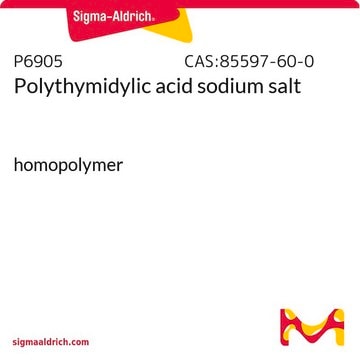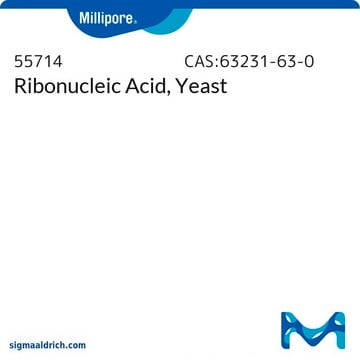This product is not tested for molecular weight or chain length. However, historical data suggests a range of 300 - 4400 bases with a molecular weight range of 128,000 - 1,900,000 daltons, respectively.
P9403
poly(A)
Sinónimos:
Polyadenylic acid potassium salt, Poly(A) potassium salt
Seleccione un Tamaño
128,00 €
Seleccione un Tamaño
About This Item
128,00 €
Productos recomendados
¿Está buscando productos similares? Visita Guía de comparación de productos
Aplicación
Nota de preparación
Código de clase de almacenamiento
11 - Combustible Solids
Clase de riesgo para el agua (WGK)
WGK 3
Punto de inflamabilidad (°F)
Not applicable
Punto de inflamabilidad (°C)
Not applicable
Equipo de protección personal
Eyeshields, Gloves, type N95 (US)
Elija entre una de las versiones más recientes:
Certificados de análisis (COA)
¿No ve la versión correcta?
Si necesita una versión concreta, puede buscar un certificado específico por el número de lote.
¿Ya tiene este producto?
Encuentre la documentación para los productos que ha comprado recientemente en la Biblioteca de documentos.
-
What about the nucleotide length? How many mers of Adenine connected?
1 respuesta-
¿Le ha resultado útil?
-
-
Which solvent is best for reconstituting poly A?
1 respuesta-
The product P9403 is soluble in water to 20 mg/ml.
¿Le ha resultado útil?
-
Filtros activos
Nuestro equipo de científicos tiene experiencia en todas las áreas de investigación: Ciencias de la vida, Ciencia de los materiales, Síntesis química, Cromatografía, Analítica y muchas otras.
Póngase en contacto con el Servicio técnico







